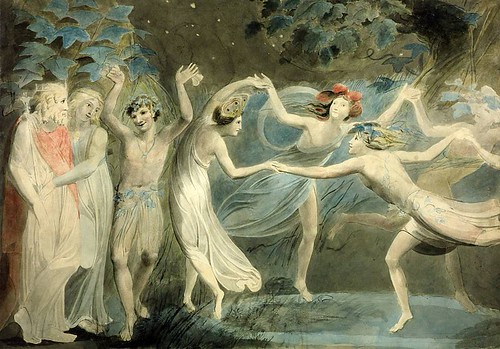While the television show The Soup brings you “the strange, obscure and totally unbelievable moments in pop culture, celebrity news and reality TV,” Word Soup brings you those strange, obscure, unbelievable (and sometimes NSFW) words from talk shows, sitcoms, dramas, and just about anything else on TV.
cahoots
Art [to Boyd]: “You’re not as dumb as you look. I like the use of the word cahoots, though.”
“Slaughterhouse,” Justified, April 10, 2012
Cahoots is defined as a “questionable collaboration; secret partnership,” and either comes from the French cahute, “cabin, hut,” or the French cohorte, “a word said to be in use in the South and West with a sense of ‘companions, confederates.’”
disadvertunity
Stephen Colbert: “While some people see a disaster, KFC Thailand saw a disaster advertising opportunity, or disadvertunity. Hey, I say there’s no reason SOS couldn’t stand for soup or salad.”
The Colbert Report, April 12, 2012
During a tsunami scare in Indonesia last month, KFC Thailand told people on their Facebook page: “don’t forget to order your favorite KFC menu.” Disadvertunity is a blend of disaster, advertising, and opportunity.
disarm
Raylan: “You know what they’re saying at the office? I disarmed him.”
“Slaughterhouse,” Justified, April 10, 2012
SPOILER ALERT: Disarm means “to deprive of arms; take the arms or weapons from.” In this context, Raylan is using the word literally.
hobbyturnity
Randy: “Filmmaking was just another hobbyturnity for me.”
“Food Trucks,” Bob’s Burgers, April 15, 2012
Hobbyturnity, a blend of hobby and opportunity, is a hobby that is also a career opportunity.
hooah
Jon Stewart: “Sarah Palin’s rather dramatic pin is in fact a barometer that tells you what side of the culture wars you’re on. If you’re a patriotic real American, you read it like this.”
Soldier: “Hooah!”
Jon Stewart: “But if you’re from New Jersey and some liberal east coast elite, you think it’s just a tongue-in-cheek homage to the Sopranos.”
Ralph Cifaretto: “She was a hooah [whore].”
The Daily Show with Jon Stewart, April 16, 2012
Hooah is the battle cry of the U.S. Army. The origin of the word is unknown though there are several theories.
inquizzical
Virginia: “I was immediately inquizzical of this mystery.”
“Inside Probe,” Raising Hope, April 10, 2012
Inquizzical, a blend of inquisitive and quizzical, is an example of an eggcorn, a lexical misuse that makes sense to the speaker or listener.
pentimento
Dr. Lee: “[Pentimento] refers to when art historians inspect a painting and discover traces of earlier work. Evidence that the artist changed his mind in the course of creating it. This is a perfect metaphor for what your mind has done.”
“Ricky’s Tacos,” Awake, April 12, 2012
In Italian, pentimento means “correction,” and comes from the Latin penitire, “to regret.”
puninator
Matt Lauer: “President Obama, meanwhile, is back at the White House this morning, following a trip to Colombia, a visit that was overshadowed by a prostitution scandal involving members of the Secret Service.”
Jon Stewart: “To the puninator!” [Cut to screen: On Her Vagesty’s Secret Service]
The Daily Show with Jon Stewart, April 16, 2012
Puninator is short for pun generator.
reverse-Urkel
Tracey: “Son, we have a lot of work today if I’m going to reverse-Urkel you.”
“Meet the Woggels,” 30 Rock, April 12, 2012
Urkel refers to Steve Urkel, a nerdy African-American character on the sitcom, Family Matters. African-American nerds are also known as blerds, a blend of black and nerd. To reverse-Urkel means to turn someone from a nerd into a non-nerd.
talk-portunity
Liz [to Jack and Colleen]: “I know it won’t be welcome, but I will point out that this is your final talk-portunity.”
“Meet the Woggels,” 30 Rock, April 12, 2012
A talk-portunity, a blend of talk and opportunity, is an opportunity to talk about one’s feelings.
transvaginal
Liz [to Jack regarding her decision to adopt or remain childless]: “You’re being so transvaginal right now.”
“Murphy Brown Lied to Us,” 30 Rock, April 19, 2012
Transvaginal refers to transvaginal ultrasounds, which some states have attempted to make required for women having abortions. In this context, Liz means that Jack is being invasive about her decision about having children.
Winklevoss
Schmidt [to Nick about their invention]: “I’m not gonna be Winklevossed.”
“Normal,” New Girl, April 10, 2012
Winklevoss refers to the Winklevoss twins who claimed that Mark Zuckerberg stole their idea for Facebook. Here, Schmidt is accusing Nick of stealing his idea for Real Apps, a set of utensils that attaches to a cell phone.
Yoko
Liz: “Wait, you’re trying to break up a children’s group?”
Jenna: “Well, it checks off a lot of boxes on my sexual walkabout list. Yoko a band, make love to a beloved children’s entertainer, be with a non-aboriginal Australian.”
“Meet the Woggels,” 30 Rock, April 12, 2012
Yoko refers to Yoko Ono, who some accused of breaking up the Beatles. Yoko in this instance is an example of anthimeria, “the use of a word from one word class or part of speech as if it were from another,” especially “the use of a noun as if it were a verb.”
That’s it for this week! Remember, if you see any Word Soup-worthy words, let us know on Twitter with the hashtag #wordsoup. Your word and Twitter handle might appear right here!

